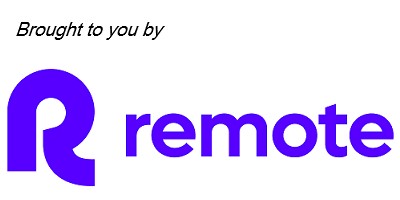BRANDED CONTENT
Hiring beyond borders: How HR platform can help Singapore businesses find, manage and pay workers
To address labour shortages and skill gaps, global HR platform Remote enables companies to hire staff around the world while taking care of employment and regulatory issues

With HR platforms like Remote, companies can access skilled workers around the world to overcome talent shortages. PHOTO: REMOTE
Follow topic:
As global talent scarcity persists, employers worldwide are struggling to find workers with the skills they need, according to recent surveys conducted by human resource advisory firm ManpowerGroup.
In Singapore, 79 per cent of companies reported difficulty in hiring the skilled talent they need in 2024, and to overcome the talent shortages, six in 10 employers here plan to offer workers more flexibility in when or where to work.
To gather this data, ManpowerGroup surveyed nearly 39,000 employers across 41 countries and territories in January 2023. The same survey found that IT and data skills are the most sought after by employers in Singapore.
While companies are doubling down on training and reskilling to address the skills gap, six in 10 employers are also looking to hire from outside their borders.
According to the Remote Tech Talent Report, countries including Poland, Hungary, Finland, South Africa, and the Philippines boast serious tech talent pools. To address the shortage of tech talent within their organisations, companies in other parts of the world have the opportunity to explore new territories that they have not yet tapped into.
“Companies need to embrace a global outlook and tap into the extensive pool of tech talent available worldwide. Our Remote Tech Talent Report clearly shows that exceptional tech professionals aren't confined to North America, India, or China. Nations such as Australia, Mexico, Finland, Hungary, and Poland also have robust tech workforces,” says Mr Job van der Voort, co-founder and CEO of Remote.

Many businesses in Singapore are interested in exploring international hiring, but many aren't sure how to do it effectively, says Remote, a HR tech company that offers solutions to help companies hire, manage, and pay distributed teams.
“As the scale of remote work increases, a local company could even now be trying to recruit a talented individual who is also considering a role with a multinational corporation based in Silicon Valley,” says Mr van der Voort.
Mr van der Voort shares his thoughts on how HR platforms like Remote can help companies find the right talent in a globalised economy.
Q: What are the key challenges companies face when trying to build and manage a remote team?
One of the biggest challenges that companies face is that a remote team may be spread across various jurisdictions, each with its own specific legal and tax requirements. Hiring and paying employees in other countries pose several challenges, including understanding diverse legal regulations, managing tax requirements and handling payroll and benefits administration.
Companies must ensure they comply with local employment laws and tax regulations, which can vary significantly from one country to another. Additionally, they need to offer competitive compensation packages and benefits to attract and retain talent.
Handling these tasks separately can be expensive and difficult for any company. As a result, many businesses opt to only hire locally, which limits the talent pool they can tap into.
Remote can help companies to manage and pay their entire team, regardless of where the team members are located. We handle the onboarding process, ensure payments are made in the local currency, offer local benefits, and support employees from hiring to departure. Our expertise and technology ensure compliance with all relevant taxes and regulations. If companies use contractors, they can also pay and manage them through Remote.
Q: How can companies motivate and retain remote workers?
Companies seeking to expand their team by hiring talent from other countries need to make it a top priority to give employees a good experience. This means building trust and making sure remote team members are treated equally to on-site employees.
Some remote workers, especially those new to working remotely, might worry about their job security because they don’t see their coworkers in person. Being open and transparent is key here: You need to talk to each employee often and clearly to be sure they feel like an equal part of the team and they understand how they can move up in the company.

Remote can help put together attractive job offers that are “culturally sensitive” – packages that take into account and respect the cultural norms, values, and expectations of employees in different countries. These could mean adding insurance plans that cover traditional medicine if that's widely used in a country or extended paternity or maternity leave in countries where it is standard practice.
Q: How does Remote Talent make hiring easier and more efficient for employers and job seekers compared to other job portals?
Traditional job search platforms were developed before remote work became mainstream, making them inadequate to meet the needs of both employers and job seekers in today’s remote work era. These platforms often focus on location-based searches and lack key details like remote work arrangements.
We have fixed these shortcomings to help companies offer their jobs to potential employees located around the world. Remote Talent also has advanced search filters made just for remote work. These let employers find candidates who meet the criteria such as being in the same time zone, being open to working flexible hours, and having previous experience working in remote roles.
This focused approach makes hiring easier for employers by cutting down on applications that don’t match the requirements and helping them quickly find qualified candidates.
For job seekers, Remote Talent provides an easy-to-use platform to find remote job opportunities that match their preferences and requirements.
Q: How does Remote make sure the job listings and candidate profiles on Remote Talent are high-quality and relevant?
The Remote Talent page uses its global presence, expertise and various HR tools to ensure job listings and candidate profiles are a good fit for the remote work role listed in countries from Canada to New Zealand.
In the future we will continue to improve Remote Talent by adding features such as AI-powered tools to connect employers with suitable candidates, and a place to allow job seekers to create their own profiles so that they can be easily matched with potential employers in future.


